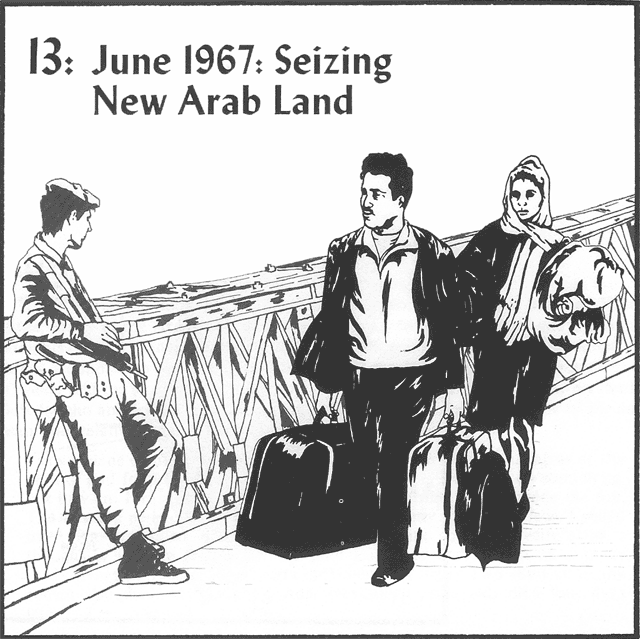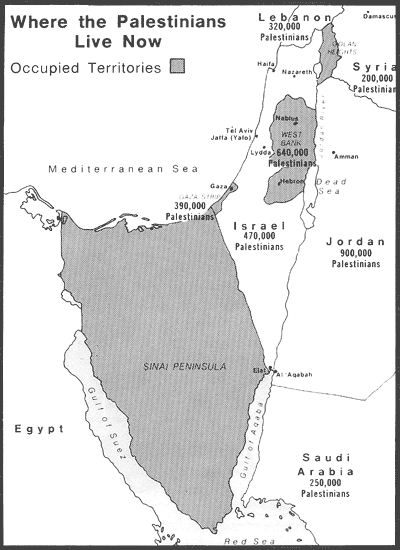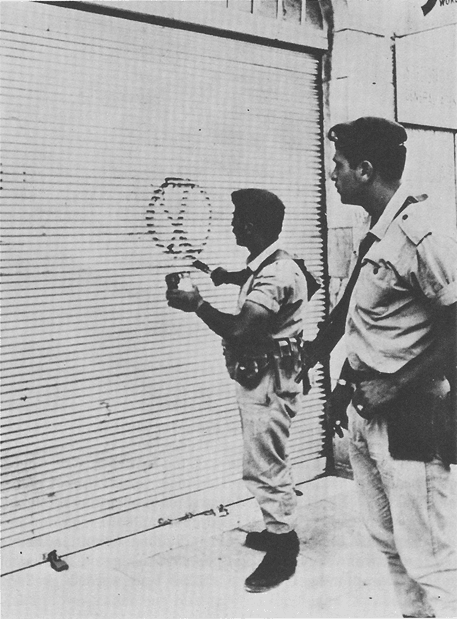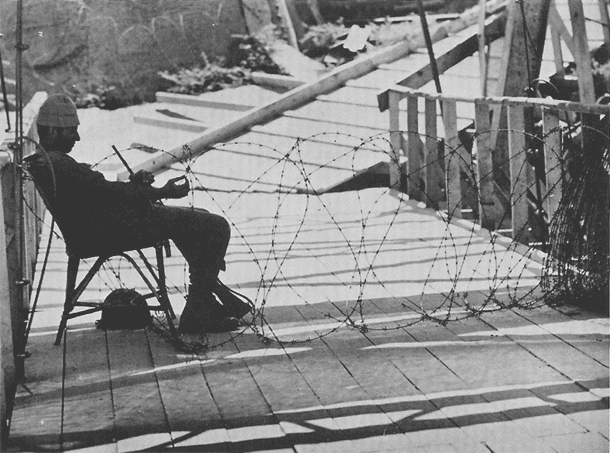Our Roots Are Still Alive - Chapter 13
Previous: Chapter 12
Table of Contents
Next: Chapter 14
New Jersey Solidarity-Activists for the Liberation of Palestine Main Site

- An occupation is an occupation. You never get used to it. To be sure, some walls have been torn down and Jerusalem is `united' but the human walls are much higher than ever.
- Basil Sahar, Palestinian school teacher
On Monday morning, June 5, 1967, Moshe Dayan ordered the attack. Flying low to evade Egyptian radar, Israeli planes headed for Egypt's airfields. The Israelis destroyed the entire Egyptian air force while it was still on the ground. The planes, sitting wing to wing, had not even been camouflaged. Nasser had expected a peace settlement in a few days. Yet for twenty-four hours after the attack, the Voice of America broadcast unceasingly that Egypt had invaded Israel. It was a version of the war many Americans never questioned.
Without air cover Egyptian troops in the Sinai desert were vulnerable targets. Thousands of Egyptian soldiers were killed or wounded. Using the shield of Mirage jets, Israeli tank brigades pushed through the desert with lightning speed, despite some fierce fighting in the Gaza Strip by Palestinians attached to the Egyptian Army. As Israel's advance quickly proved, the Arab countries were not prepared for war.1 The Syrian defenses crumbled rapidly. In Jordan, the Palestinians living on the West Bank had never received the arms that they demanded of King Hussein after the Sammou raid. Resistance to the Israeli invasion was individual and ill-armed. In Jerusalem there was house-to-house fighting - resistance which the Israeli Defense Ministry called "the toughest fighting of the war."2 The people of Jerusalem were forced to defend themselves, as the Jordanian Army remained stationed on the outskirts of the city.3

Even as the Egyptian Army was being defeated, tens of thousands of people throughout the Arab countries rallied to the fight against Israel. Students left final exams to enlist in the army for training or to go directly to the front to help in any way they could. In the schools and marketplaces, people collected food and supplies for the soldiers. Volunteers joined the Red Crescent medical aid teams and set up blood banks. Many people prepared for a long battle, confident of an Arab victory. They were stunned when, after only six days, the war ended in a humiliating defeat. The smashing Israeli victory suddenly revealed both the hidden weaknesses of the Arab governments and the expansionist nature of the Jewish state.
On the first day of the war, Moshe Dayan had grandly proclaimed: "We have no aim of territorial conquest."4 Yet even after the cease-fire, Israeli troops pushed through Syria until they captured the Golan Heights. Determined fighting by Fatah units delayed their drive, but Fatah's small arms could not stop the onslaught of Israeli planes, tanks and mortars. The Israelis expelled thirty-five thousand people from the Golan and sacked the provincial capital of Kuneitra.5 By the end of the war, Israel had captured Syria's Golan Heights, the Egyptian Sinai and Gaza, and Jordan's West Bank. In six days, Israeli territory had tripled in size. A million more Palestinians - those in the West Bank and Gaza - were now under Israeli occupation. As in the 1956 Suez War, none of the battles were fought inside Israel itself.
"De-population"
Israel's triumph took thirty-five thousand Arab lives and six hundred Israeli lives. Many of the Arabs who died were civilians. In the West Bank and the Golan Heights, Israeli planes bombed villages and dropped napalm. Napalm rained on areas around Arab Jerusalem, Bethlehem, and the East Bank of the Jordan.6 Sami Oweida told the story of his family to a British professor. During the war his family left Jericho and tried to cross the King Hussein Bridge to the East Bank of the Jordan and relative safety. According to Oweida's account:
- I saw a plane come down like a hawk directly at us. We threw ourselves on the ground and found ourselves in the midst of fire.... I tried to do something, but in vain. Fire was all around. I carried my burning child outside the fire. The burning people became naked. Fire stuck to my hands and face. I rolled over. The fire rolled with me. I saw another plane coming directly at us. I thought it was the end. I saw the pilot lean over and look at us.
My daughter Labiba (four years old) died that night. Two children of my cousin also died. My daughter Adla (seventeen years old) died four days later.7
The Oweida family was part of a stream of two hundred thousand refugees from the West Bank. Some left to escape the bombings and napalm. Others were forced out by Israeli bulldozers. Within a few days after the war, Israeli soldiers leveled seven villages near the Jordan River. A miller from Beit Nuba, one of the seven villages, explained to A. C. Forrest, a Canadian clergyman:
- The Israelis first shelled the village. Then they moved in and ordered us all out and told us to walk towards Ramallah. Eight persons were killed. Some old people who were ill couldn't leave. They were buried alive. The Israelis said the area was a military zone. They demolished my mill and carted it away, but they bulldozed everything else under.8
Twenty thousand villagers became refugees. The Israelis had cleared their new border of Palestinians and readied it for possible Jewish settlement.
Israel called this policy of expulsion "de-population." In the city of Tulkarm in the West Bank, Israeli soldiers forced fifteen thousand Palestinians into trucks and dumped them at the Jordanian border. The Israelis pointed their guns at the people and told them: "Go to Hussein."9 Many of these refugees were fleeing the Israelis a second time, having fled from cities inside Israel to the West Bank in 1948. Israeli soldiers carefully planted eucalyptus trees in the red soil of the demolished West Bank villages. Eucalyptus grows quickly. The next year tourists saw flourishing young groves on the graves of Palestinian villages.
In the Syrian Golan, Israeli soldiers expelled another ninety-five thousand people. These refugees joined those who had fled to Damascus during the actual fighting. The Syrian capital was swollen with people who had no shelter, food or jobs. Within weeks Israel put out a call to Jews all over the world, asking them to come and settle in the Golan. Soon a dozen military settlements dotted the Syrian land.10
Almost as soon as the firing stopped, the refugees demanded to return to their homes. Over one hundred fifty thousand West Bank Palestinians applied immediately to the Israeli government for permission to return home. Israel reluctantly approved only eighteen thousand applications.
Significantly, not one application was accepted from residents of Jerusalem.11 The treasured city was finally in Israeli hands. Ben-Gurion arrived at the Wailing Wall in triumph to celebrate the "return" of the city to its "rightful owners." He frowned when he noticed a sign in Arabic, and an aide immediately tore it down. A flood of petitions and telegrams from religious groups around the world pleaded with the Israelis not to annex Jerusalem to Israel. They proposed an "international administration" for the city. But on June 21, Israel officially annexed Jerusalem.
Realizing that Israel was blocking their return in every possible way, many refugees from the West Bank tried to cross the Jordan River and return home without official papers. A young Israeli soldier published an account of the fate of Palestinians who tried to do this:
- Every night Arabs cross the Jordan from east to west. We blocked the passages ... and were ordered to shoot to kill without warning. Indeed, we fired shots every night on men, women and children. In the mornings, we searched the area and, by explicit order from the officer on the spot, shot the living, including those who hid or were wounded.12
The Israeli government banned the newspaper that published this story and arrested its distributors as sellers of "obscene literature."
Israel Reaps Rewards of Conquest
The Israeli press and the pro-Zionist media in Europe and the United States ignored the fate of the refugees and the brutal reality of Israeli occupation. They celebrated the "heroic" Israeli victory over the aggressive Arabs who had vowed to destroy the Jewish state. American publishers churned out popular books like Six Days in June and Strike Zion! that faithfully reflected the Israeli and American version of the war. A study of American reporting during the war showed that Arabs were most frequently described as dark, shifty-eyed and cowardly; the Israelis, however, were more often pictured as hard-working, handsome and brave.13 These books, countless articles and TV and radio stories built a strong base of support for Israel's new role as the American watchdog in the Middle East.

Israeli soldiers mark the shops of Palestinians striking to protest the annexation
of Jerusalem.
Against this backdrop of slick propaganda, almost no one spoke out for the victims of Israel's expansion. One journalist noted:
- Writers who try to present the Arab view are vociferously condemned privately and in public; every possible kind of pressure is exerted to try to silence the unwelcome opinion, and as a last resort, charges of anti-Semitism have been leveled. It makes writers wary. . . .14
Few writers braved the fire. Most commentators joined in painting a picture of Nasser as a villain equal to Hitler. Nasser and the Arabs wanted to crush Israel, but the Israelis had turned the tables on the oppressor. A small David had conquered the bloodthirsty Goliath.
It was a story that captured not only the imaginations but the pocketbooks of Americans, especially American Jews. New York and other cities were the scenes of large fundraising dinners. Zionist organizers raised thousands of dollars by collecting donations on streetcorners and ringing doorbells. On the campuses, students stood in line to donate blood for Israel. When the war ended, they signed up to work on a kibbutz for the summer. In the six days of the war, the United Jewish Appeal sold $220 million worth of Israeli Bonds. Gottlieb Hammer, vice-chairman of the United Jewish Appeal, observed, "When the blood flows, the money flows."15 Contributions for Israel from Americans in 1967 totaled $600 million.

The Israelis were confident that they had defeated the Palestinian guerrillas.
Israel's biggest bonus from the June War was not individual support, valuable though that was. The greatest gain was the recognition in Washington that Israel had dealt Arab nationalism a stunning blow and should be rewarded. A State Department memo concluded:
- Israel has probably done more for the U.S. in the Middle East in relation to
money and effort invested than any of our so-called allies and friends elsewhere around the world since the end of the Second World War. In the Far East, we can get almost nobody to help us in Viet Nam. Here, the Israelis won the war singlehandedly, have taken us off the hook, and have served our interests as well as theirs.16
Unlike the Thieu regime in Vietnam, Israel had not required U.S. troops to fight the U.S. government's enemies. The United States finally acknowledged Israel as regional "policeman" for American corporate interests in the Middle East. The United States sent Israel a flood of sophisticated weapons, including Phantom jets, which greatly strengthened Israel's impressive military machine. In the four years after the war, Israel would receive $1.5 billion worth of arms from the United States - ten times the amount sent in the previous twenty years. The U.S. Agency for International Development (AID) added another $75 million worth of free military aid. In subsequent years 10 percent of all foreign aid from the United States went to Israel.
This aid helped solve the problems that had plagued Israel's economy before the war. As Israeli troops took up their positions on the country's new frontiers, U.S. and Israeli leaders hoped that the military defeat of the Arab nationalists had ended the fedayeen attacks on Israel's borders. The Israelis also thought Nasser would decide that it was futile for Egypt to continue fighting Israel and the United States.
In fact the war had exposed the fatal weaknesses of Nasser's leadership. Nasser's "socialism" had not been genuine socialism. The people of Egypt did not collectively run the factories and farms, fill the ranks of popular militias and a people's army, or play a major role in the political decisions of the nation. Under Nasser's rule, a class of military officers and government bureaucrats had gained power at the expense of Egypt's peasants and workers. Nasser had caved in to the Israeli offensive because he could not risk the only other real option - mobilizing the Egyptian people in a protracted war against Israel.
Nasser's political party had relentlessly driven from political power those who spoke out for such an alternative - communists, socialists and trade union leaders. Rather than arm and mobilize the people, Nasser and his circle had relied on a professional army and guarantees of support from the Soviet Union. When Israel struck, the professional army collapsed. The Soviet Union, anxious to avoid a head-on collision with the United States, did not use its own military threats to pressure for Israeli withdrawal as it had done in the 1956 Suez War. After the June War, Israel still occupied Egyptian territory.
The War Is Not Over
On June 9 Nasser went on the radio and offered his resignation to the Egyptian people. He turned over the reins of power to Zakaria Moheidden, a man eager to end the fight with Israel and the United States and to open Egypt to American investment. American and Israeli leaders had achieved what they wanted: Nasser, "the hero of the Arabs," was defeated. But within hours after Nasser's resignation, millions of Egyptians poured into the streets. They chanted, "No imperialism, no Zakaria, no leader but Nasser!" To Egyptians, Nasser was still the symbol of the fight against foreign domination. Given a choice between him and Moheidden, they stood beside Nasser.
Although Nasser resumed power, he changed none of the basic conditions that led to Egypt's defeat in the June War. Instead, he turned once again to the Soviet Union to rebuild his professional army. Eighty percent of Egypt's military capabilities had been destroyed by Israel. Egypt would get new weapons, but not the political and social changes it needed to resist the power of Israel and the United States.
Instead, Egypt relied on worldwide condemnation of Israel to force the return of occupied Arab land. In the United Nations the Soviet Union sponsored, and the United States supported, Security Council Resolution 242, demanding that Israel return the occupied areas. But the resolution did not strike at the heart of the conflict. It recognized the legitimacy of the Zionist state and referred to the Palestinians as a "refugee problem," not a people having rights to their own country. Even so, Israel refused to comply with the resolution, and the United States did not pressure it to do so. After June 1967, Israel was condemned by most countries of the world. Its only firm allies outside the United States were South Africa and Rhodesia, settler colonies like itself.
Although Israel had defeated the Arab armies and continued to occupy Arab land with the support of U.S. imperialism, the resistance of the Arab peoples to U.S. domination was still alive. In Beirut, Amman and Damascus, thousands stormed the U.S. embassies in waves of powerful demonstrations. Fortune magazine, written for American business, reported:
- Not since the Boxer Rebellion [in China] has there been as rapid ... a revulsion against a foreign power as against the U.S. in the Middle East.17
In Saudi Arabia, where any protest is against the law, oil workers went on strike at ARAMCO, the giant U.S. oil conglomerate. The Saudi government arrested and deported eight hundred Palestinians for "anti-American activities." In Libya oil workers walked off their jobs at American installations. The king jailed the leaders of the strike and sent in the police to force people back to work. To angered Arab workers and students, the June War had shown that the United States was without a doubt the committed imperial sponsor of Israel.
Within the old city of Jerusalem, in the newly swollen refugee camps, in cities of the West Bank and Gaza, Palestinians renewed their determination to defeat Zionism and imperialism. Zionist leaders thought that the war would crush the Arab nationalist governments and end the Palestinian cry of "people's war." Instead, they found the cry raised within their new borders, as more and more Palestinians began to embrace the goals of the armed Palestinian Resistance. Amos Kenan, a well-known Israeli writer, witnessed an Israeli army unit destroying a Palestinian village during the June War. In a letter to the Israeli parliament, he wrote:
- The chickens and doves were burned in the rubble. The fields were turned into wasteland in front of our eyes. The children who went crying on the road will be fedayeen in nineteen years.... Thus we have lost the victory.18
Footnotes
- Edgar O'Ballance, The Third Arab-Israeli War (Hamden, Conn.: 1972), p. 65.
- Schleifer, The Fall of Jerusalem, p. 180.
- Ibid., p. 166.
- Ibid., p. 161.
- A.C. Forrest, The Unholy Land (Old Greenwich, Conn.: 1972), p. 92.
- Ibid., p. 17 and Schleifer, p. 181.
- Forrest, p. 17.
- Ibid., pp. 14-15.
- Schleifer, p. 209.
- Forrest, pp. 93-96.
- Schleifer, pp. 218-219.
- Nimas (an underground Israeli newspaper), cited by Schleifer, p. 221.
- Michael W. Suleiman, "American Mass Media and the June Conflict," in Ibrahim Abu-Lughod, ed., The Arab Israeli Confrontation of June 1967: An Arab Perspective, (Evanston, Ill.: 1970), pp. 141-42.
- Forrest, p. 45.
- L. Mosher, National Observer, 18 May 1970, cited by Freed, War in the Mid East, p. 41.
- U.S. News and World Report, 19 June 1967, p. 42, cited by Petran, Zionism, p. 16.
- Fortune magazine (September 1967), cited by Freed, p. 91.
- Israel Imperial News (an underground Israeli newspaper), cited by Schleifer, p. 210.